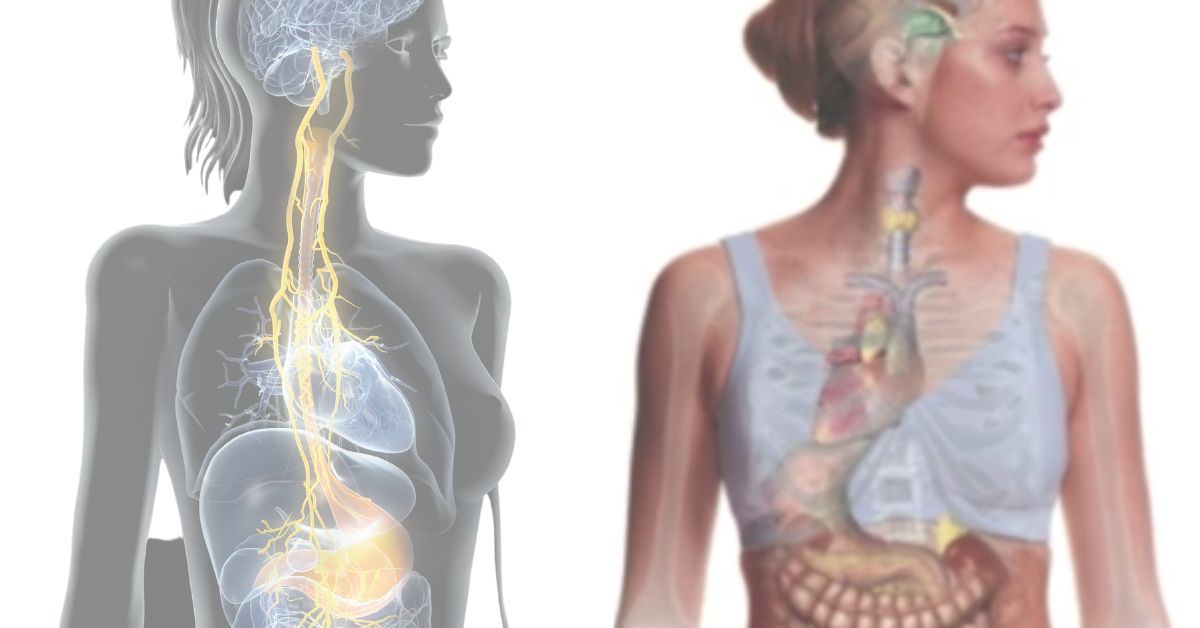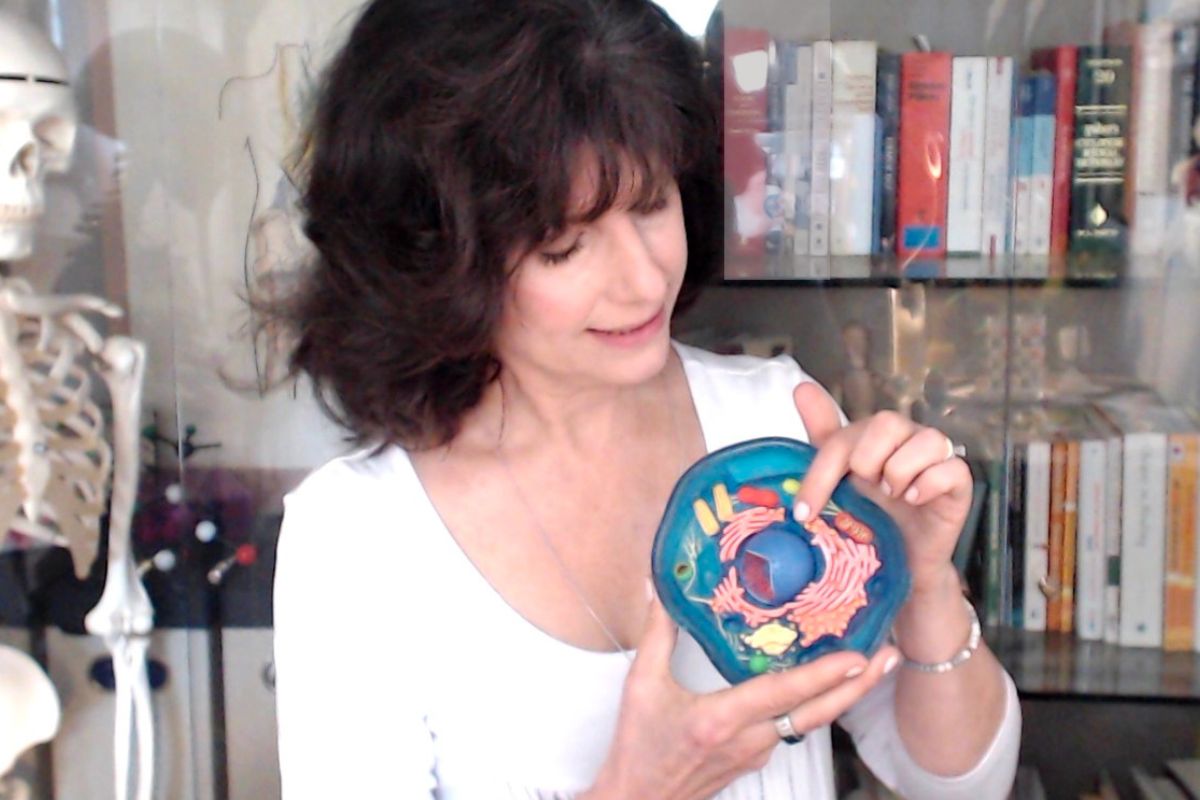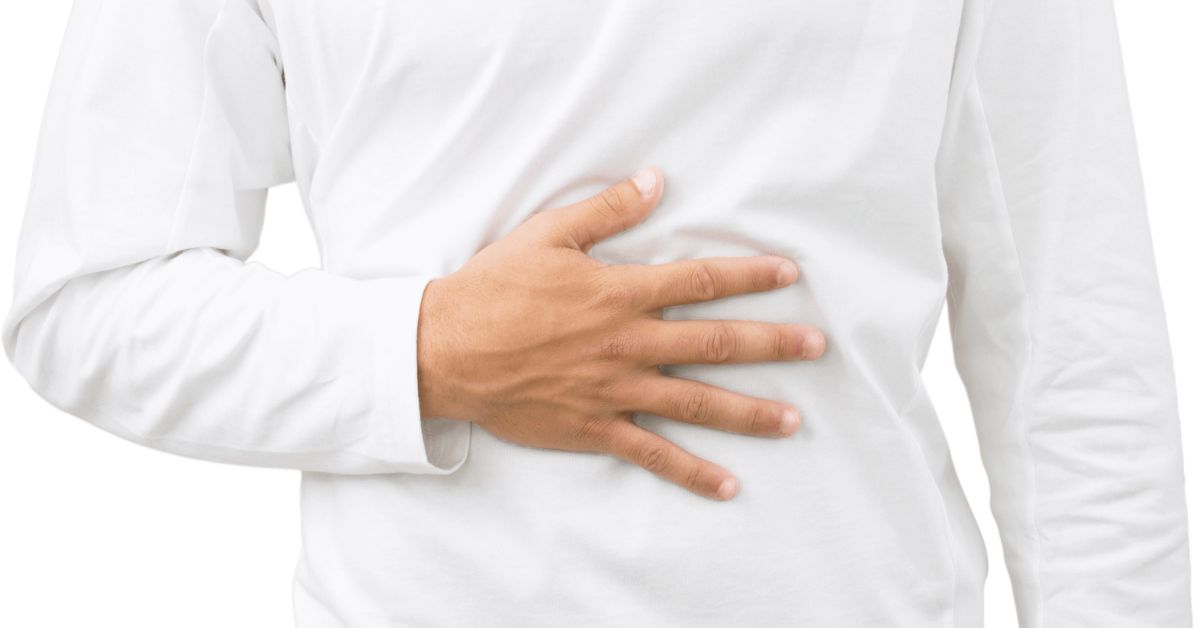#1 Cause of Indigestion
Indigestion causes: this post highlights causes and the #1 Cause of Indigestion. It is Part 1 of a 2 Part Series.
Part 2 Post: 4 SIMPLE Indigestion Helpers
Indigestion is one of the most common digestive disorders.
It is defined as:
“pain, a burning feeling, or discomfort in your upper abdomen · feeling full too soon while eating a meal · feeling uncomfortably full after eating a meal.” (1)
If you experience symptoms of indigestion, the ones that grab your attention because they are uncomfortable, even painful, like:
- heartburn
- bloating
- gas
- nausea
Consider today’s information before taking something that’ll lower your stomach acid because repeatedly lowering your stomach acid might be counterproductive.
“as many as 70 percent of people experience no benefit from taking antacids, and they actually make the underlying condition (low stomach acid) worse” (2)
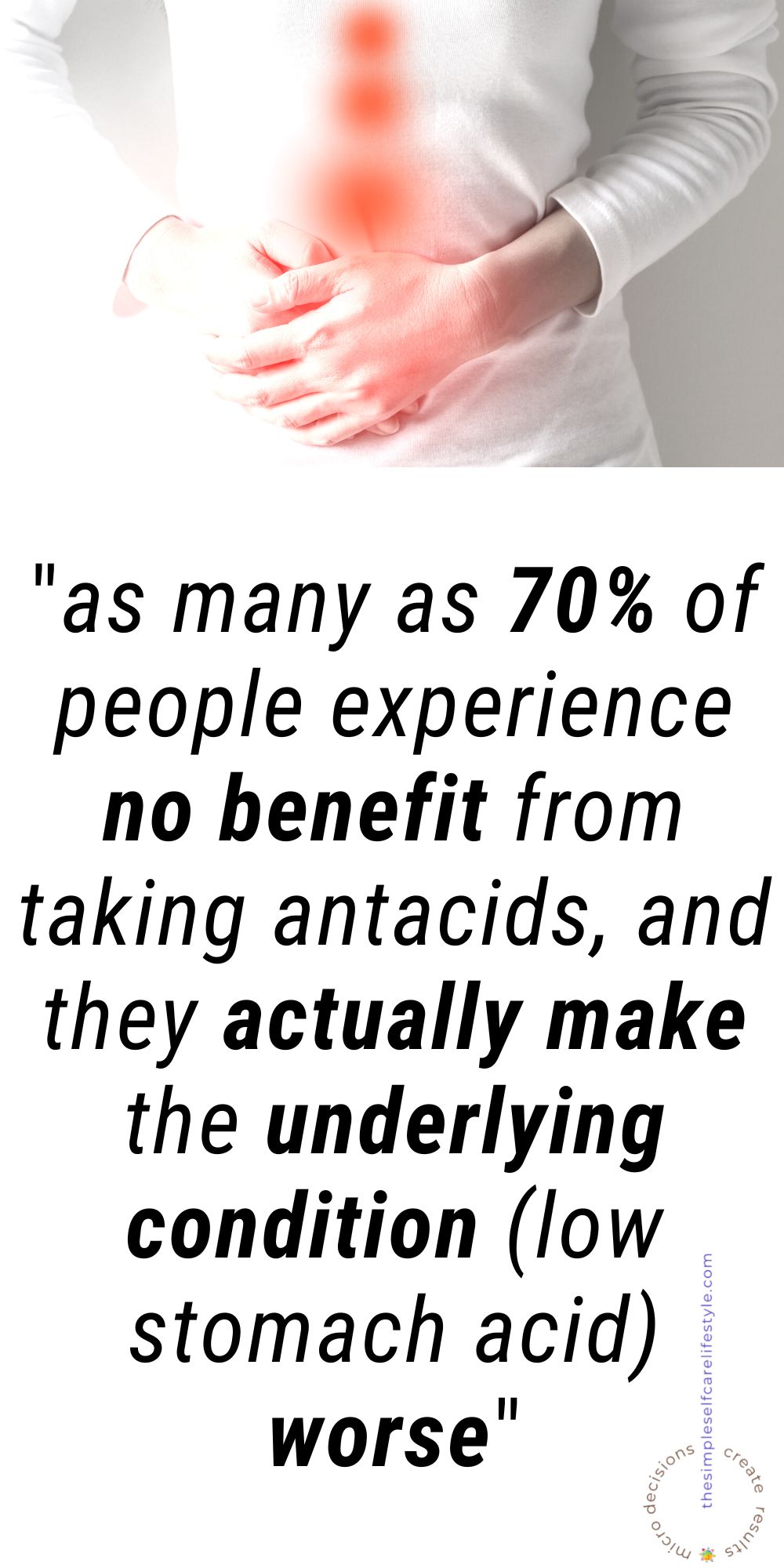
(2)
Unfortunately, this common tendency to try and lower stomach acid in response to indigestion, especially repeatedly using over-the-counter or prescription meds, will ultimately exacerbate the very symptoms you are trying to get rid of.
Most COMMON Cause Indigestion
Indigestion causes are many and can be a fleeting experience. BUT Indigestion gets exacerbated and can become frequent even chronic because of the most common reason, the actual TRUE CAUSE for most indigestion, and that is stomach acid that is too LOW.

Our symptoms become more substantial and chronic when we treat them as if their source is excess stomach acid.
Knowing our indigestion symptoms are most likely caused by low stomach acid means we can do 4 simple things known to improve stomach acidity.
Lastly, a quick note that low stomach acid can contribute to and even be a root cause of many other body symptoms.
Here’s an image with a small sampling of other body signals/symptoms that can be the result of low stomach acid.
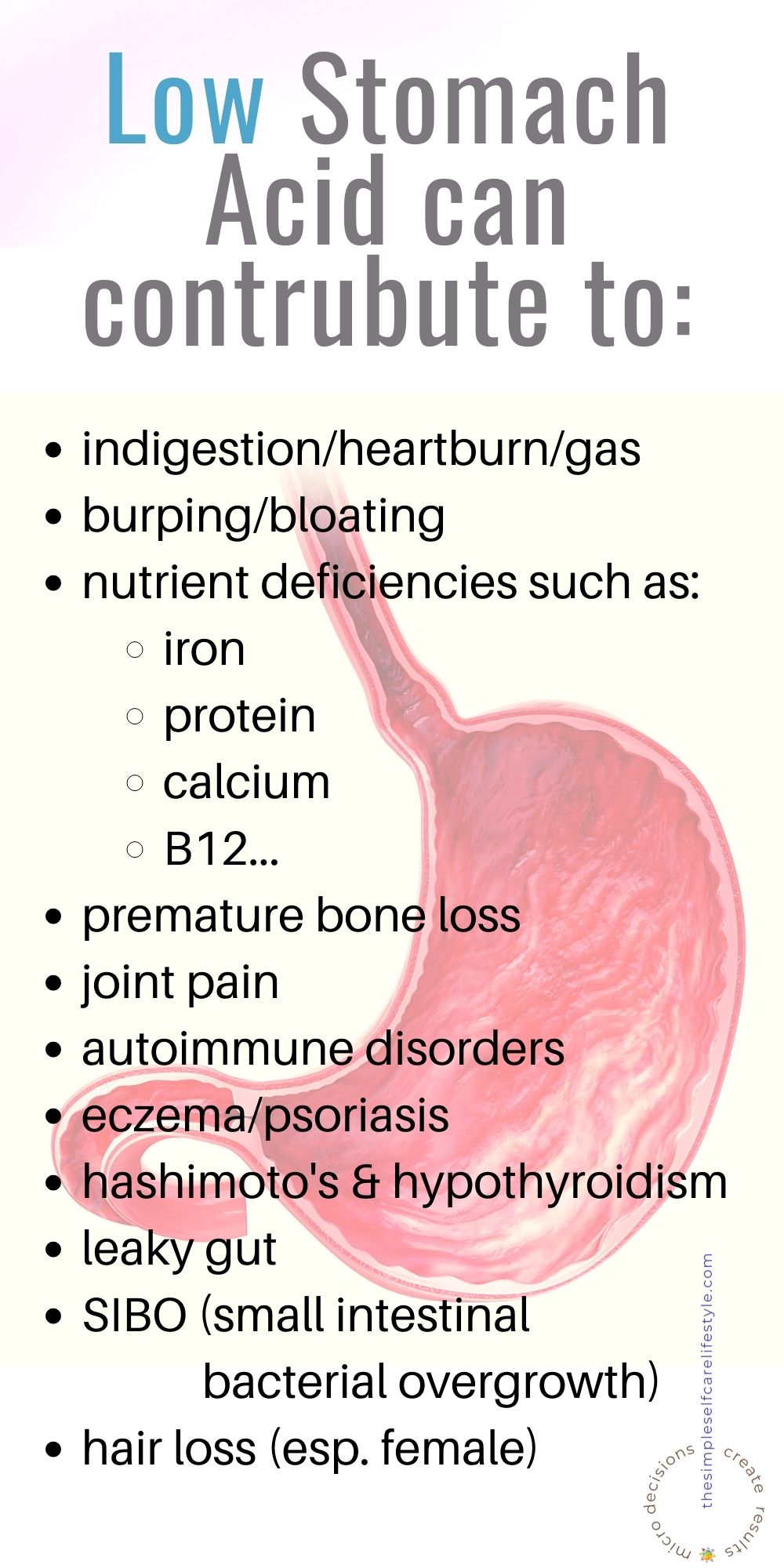

“researchers confirmed what many naturopathic and integrative medicine practitioners have been championing for years—that aging and other factors lead to decreased stomach acid production, and hypochlorhydria symptoms can cause not only uncomfortable digestive issues but other more serious problems as well.” (3)(8)(bold added)
Indigestion Symptoms & Other Body Signals Are Helpful to Know.
Those whose low stomach acid doesn’t specifically show up as indigestion but instead shows up as a slow manifesting of other health consequences also rooted in low stomach acid can use the same 4 SIMPLE things we cover in post 2: 4 Indigestion Helpers

Low Stomach Acid is The Number One Culprit For Indigestion
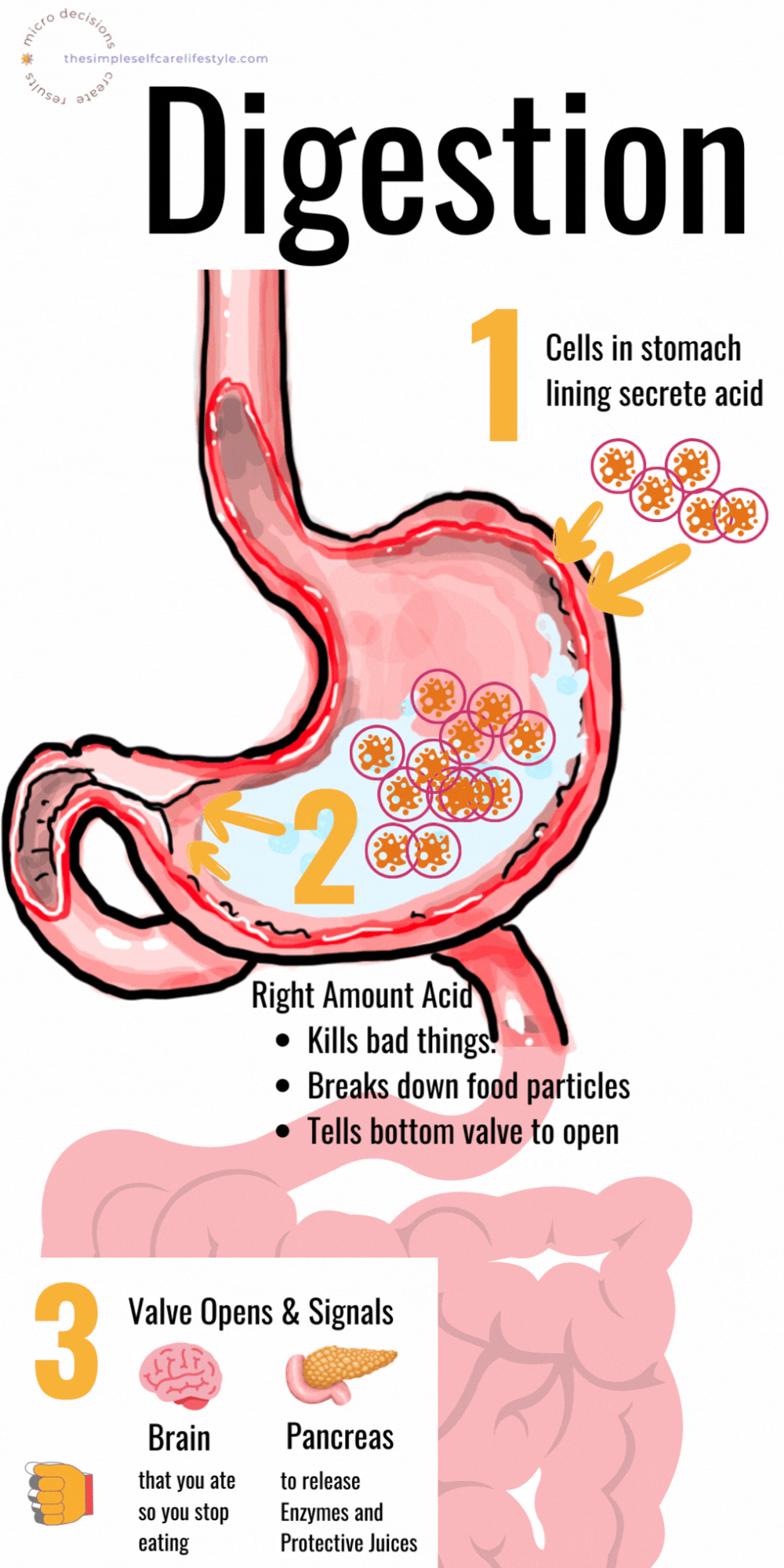
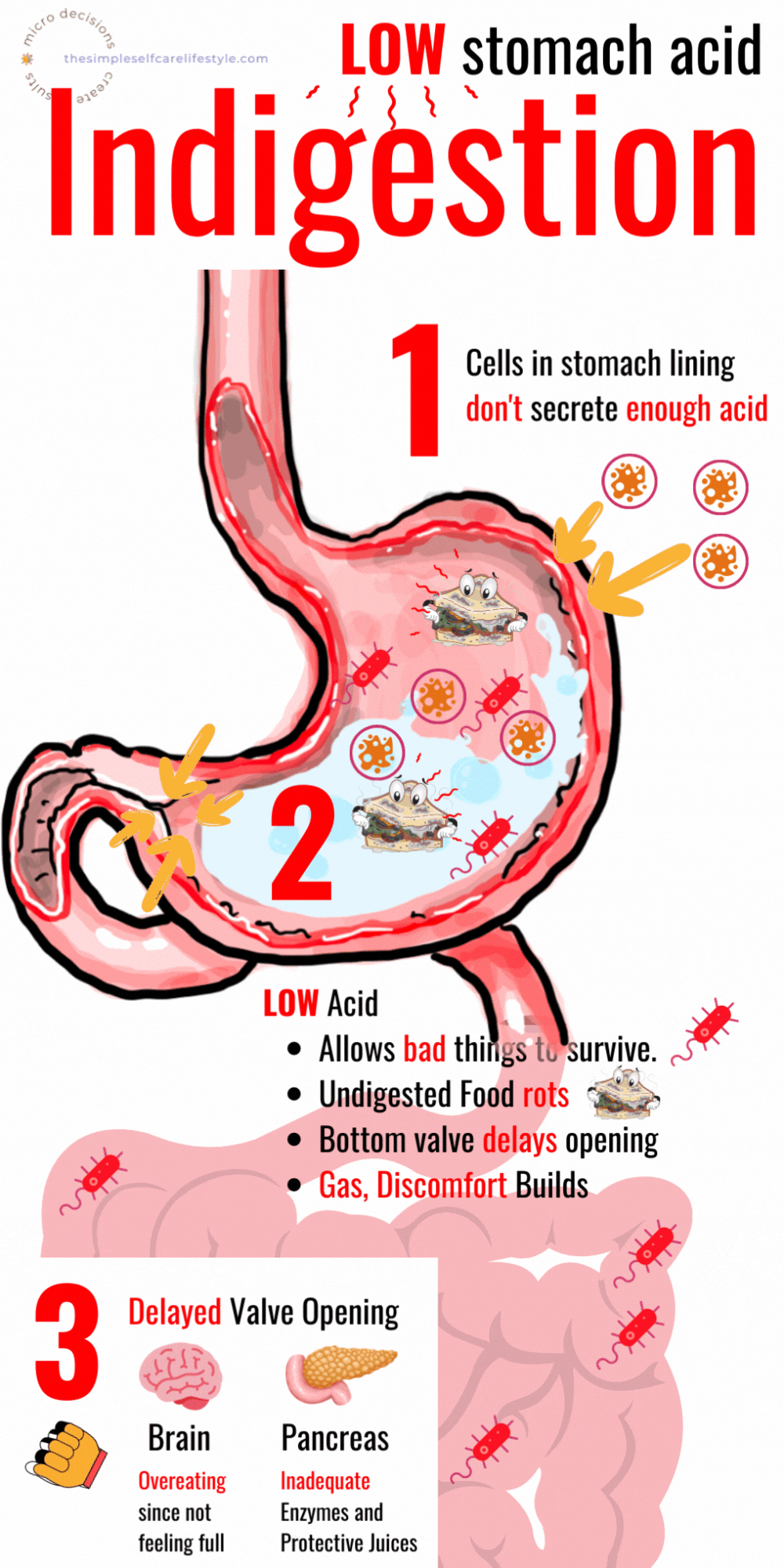

“Although much is said about hyperacidity conditions, the most common cause of indigestion is a lack of gastric acid secretion.” (4)(italic bold and underline added)
Excess acid is blamed for indigestion, but the research shows that the exact opposite is true.
“LOW Stomach Acid is the culprit for the intense discomfort most people experience and blame on an ‘acidic’ stomach.” (5)
LOW Stomach Acid is the culprit for the intense discomfort most people experience and blame on an ‘acidic’ stomach
(5)
Being told you may have low stomach acid when you experience pain can feel counterintuitive.
When bringing up low stomach acid with clients, the question that came up the most was:
If My Stomach Acid is Low, Why Can It Feel Painful or Burn?
The reason for the pain/burning sensation is (oversimplified for illustration reasons) this cascade that low stomach acid creates.
- Low stomach acid decreases our ability to digest food.
- Undigested food begins to rot. (Ferment)
- Gas is produced from the rotting food and builds up pressure.
- The valves between the stomach and our upper chest/throat region and the bottom of our stomach and our intestines get pressed upon, sometimes creating bloating/discomfort.
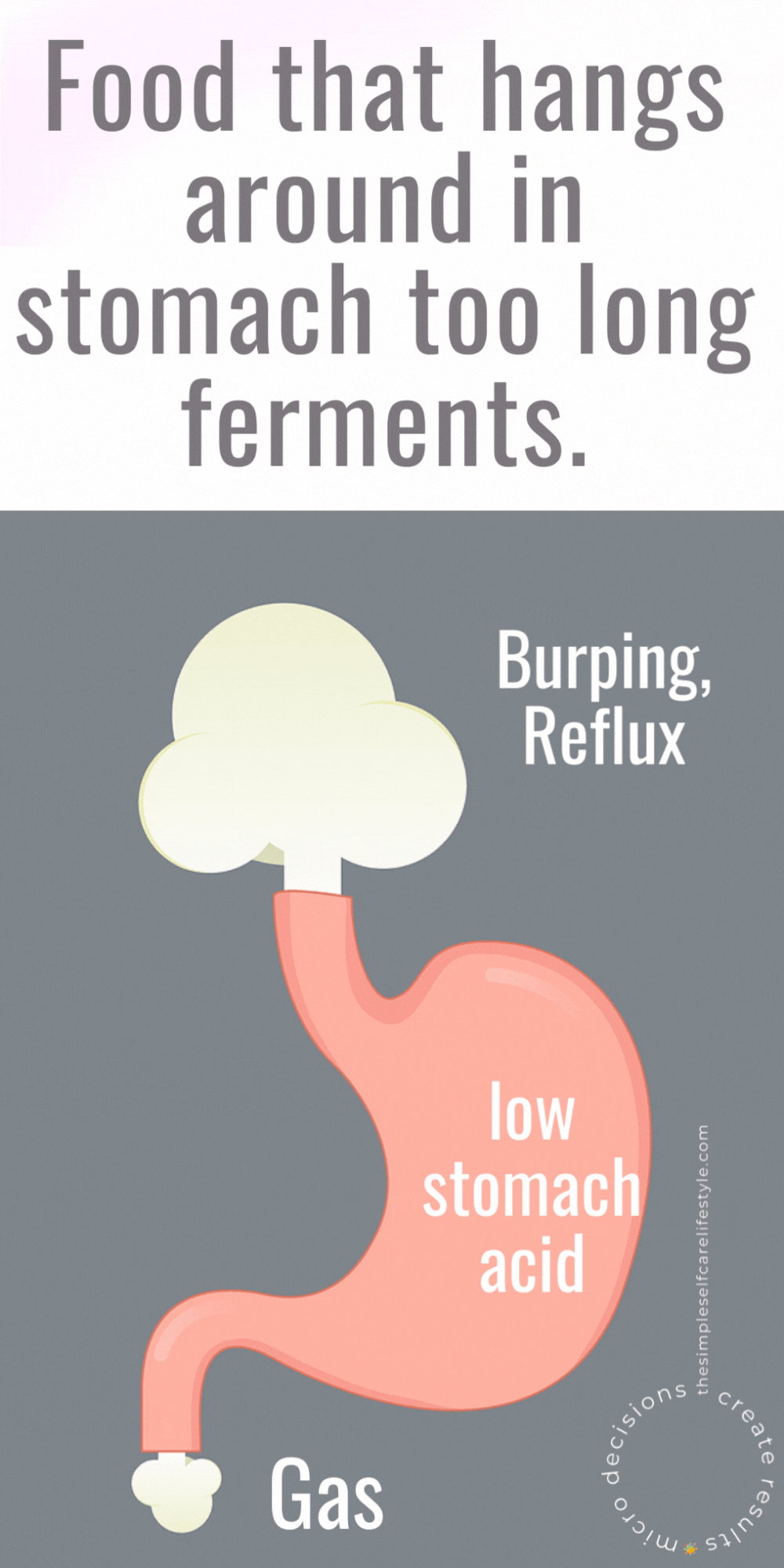
(3)(8)
“low stomach acid leads to decreased digestion, this leads to food that ferments and causes bloating that starts pushing through the lower esophageal sphincter (LES), causing acid reflux” (5) (underline and bold added)
“Increased intra abdominal pressure relative to LES resting pressure permits reflux of gastric contents into the distal esophagus.” (6)(7) (underline and bold added)

Food Hanging Around Too-Long Ferments
When there is not enough stomach acid, food does not break down as it should, and the above cascade results in uncomfortable symptoms such as:
- burping,
- acid reflux,
- heartburn,
- gastro-esophageal reflux disorder
The pain can be a result of the rotting (fermenting) food that’s producing gas. The gas bubbles can add up, creating internal pressure that pushes upward and outward.
The expanding gas may place enough pressure on the opening of the valve that separates the stomach and the esophagus to allow some acidic liquid to squeeze back through.
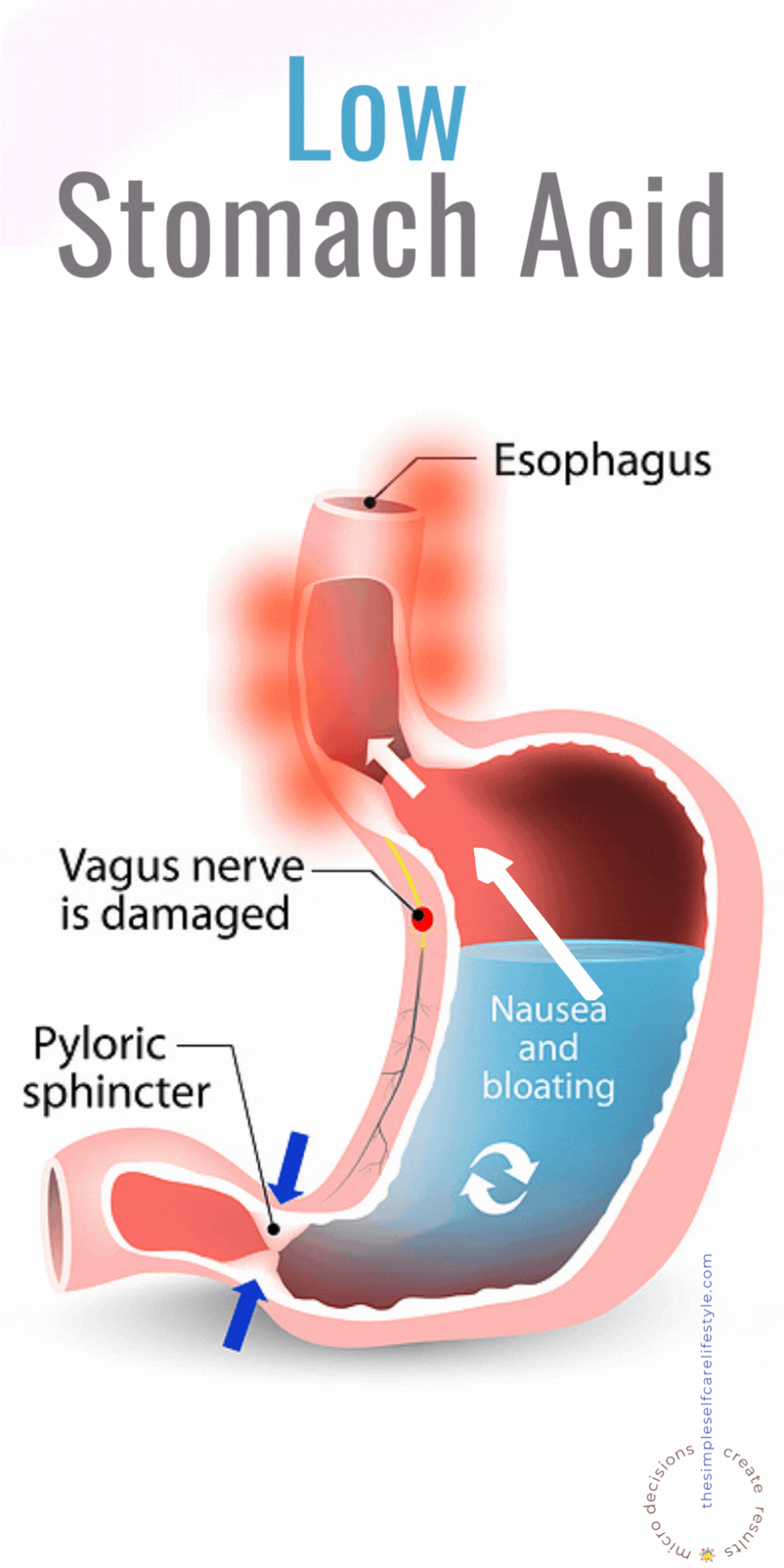
Acid from the stomach that reaches back up into the esophageal tube will cause a burning sensation.
This burning sensation can be attributed to the acid hurting the tissue.
The Cascade Continues Next by Impacting Our Foods Ability to Move From Our Stomach into Our Intestines
To continue breaking down our food into molecules that our cells can recognize and use, the next step in optimal digestion is moving food from our stomach into our intestines.
Unfortunately, another glitch low stomach acid creates is that it causes a delay in moving food into our intestines.
There is another valve that separates our lower stomach and upper intestines.
Optimal stomach acidity signals this valve to open so our food can empty into our intestines.
When our stomach acid is too low, the valve gets out of sync- delaying its opening. (⬆Blue arrows⬆ in the above image point to this valve).
The result is our stomach is slower to empty its contents into our intestines.
This delayed opening of the valve impacts many things.

2 vital mechanisms the delayed opening impacts:
- The signal to our Brain that we’ve had enough to eat.
- Signals our Pancreas needs to do its job of releasing digestive enzymes and protective juices that keep our intestines safe from the acidity.
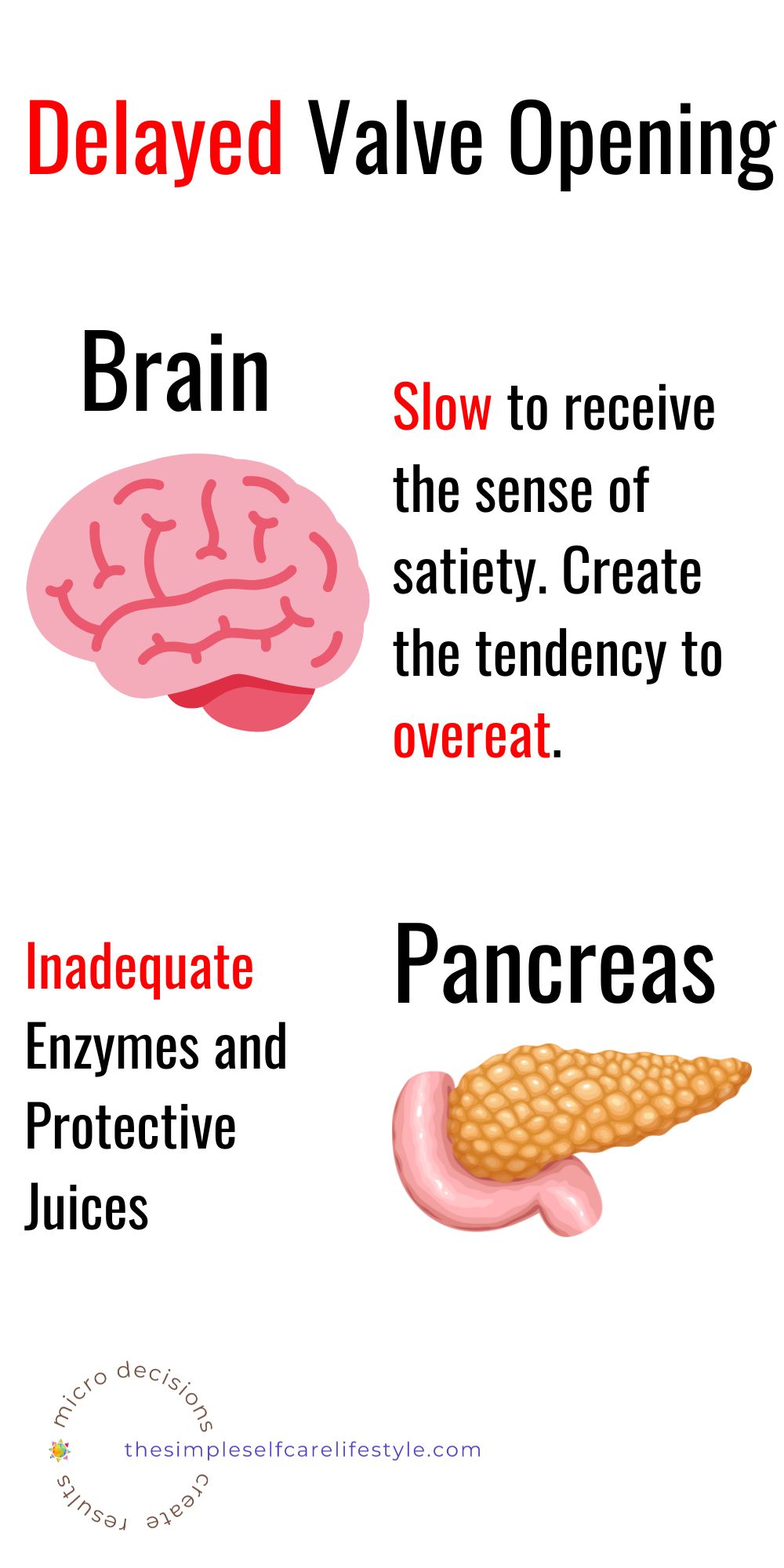
Why Our Sense of Satiety is Important
The brain receiving the signal of satiety is a vital mechanism.
The slowed gastric emptying of food into the intestines impacts our sense of satiety negatively.
This reduced signaling is significant to our long term well-being.
You see when our sense of satiety gets delayed, we are more likely to overeat.
The reason I chose this particular ramification to highlight is because overeating can be one of the causes of lower stomach acid. (We’ll cover that in part 3)

The Fact That Our Pancreas is Missing Signals is Important too!
Once the valve from the stomach to the small intestines does open and our stomach contents finally make their way into the upper portion of the small intestine, (1) the low stomach acidity- that we began this cascade with- will continue its negative impact by reducing the signaling that’s integral for our Pancreas to do its important jobs.
What Jobs?
The Pancreas releases
- digestive enzymes to ensure the food from our stomach breaks down further.
Plus it spurts
- protective juices into our intestines so that the liquid food that is moving through our intestines has the right acidity.
The right acidity is created when the protective juices make it into the intestines. This is so the liquified food doesn’t damage or burn our delicate intestinal tissue which done repeatedly can be a cause for ulcers.
All this from stomach acid that’s too low.

To pull this all together for you I’ve created 2 images.
- This first simplified illustration is the cascade we’d like to happen when we eat.

2. This second visual is of course- again oversimplified- but my hope is it conveys in a SIMPLE way how the LOW stomach acid cascade can cause indigestion.

My hope is that the combined descriptions and images are helpful for you to see how valuable it is to know that the #1 Cause of Indigestion is Low Stomach Acid.
This way you can take steps to protect yourself as well as improve any symptoms low stomach acid may be creating for you.
🎯 Putting it all together into one focus.
We Covered Three Important Mechanisms That Go Awry When Our Stomach Acid is Too Low
1. Our food isn’t effectively broken down into smaller molecules. The result:
- food sits too long
- begins to rot and ferment
- it may place excess pressure on the top valve of the stomach and allow acid to push back up into the esophagus.
2. The signal for the lower valve we want to open allowing our broken-down food molecules to empty into the upper intestines becomes out of sync. The emptying of food from the stomach to intestines slows.
Slow emptying can:
- reduce our sense of satiety
- this can promote overeating
- overeating can lower stomach acid
3. Low stomach acid can weaken the signaling to our Pancreas, which is responsible for sending out:
- ‘juices’ that protect our intestines and
- digestive enzymes so we can further break down the food into the molecules our cells can use.

The 3 Important Mechanisms
Your
- Undigested Food
- Slowed Emptying Of the Stomach
- Out of Whack Pancreas Signaling
Matter A LOT When it Comes to Our Overall Health and Well Being.
Indigestion caused by low stomach acid, something that should not be ignored.
Correcting low stomach acid has many benefits.
For one it’ll help our body avoid the depletion of vital nutrients that will slowly but surely add up over time creating dysfunction in MULTIPLE Systems.

Having this simplified awareness of how LOW stomach acid impacts our digestive system means we can avoid the common mistake of repeatedly reaching for antacids or eating foods that are highly alkalinizing over and over.
We can instead take steps to balance our stomach acid.
Todays Simple Self Care Tip:
Low Stomach Acid may be setting you up for indigestion. Consider exploring 4 Things That Help Indigestion and implementing what works for you and your lifestyle.
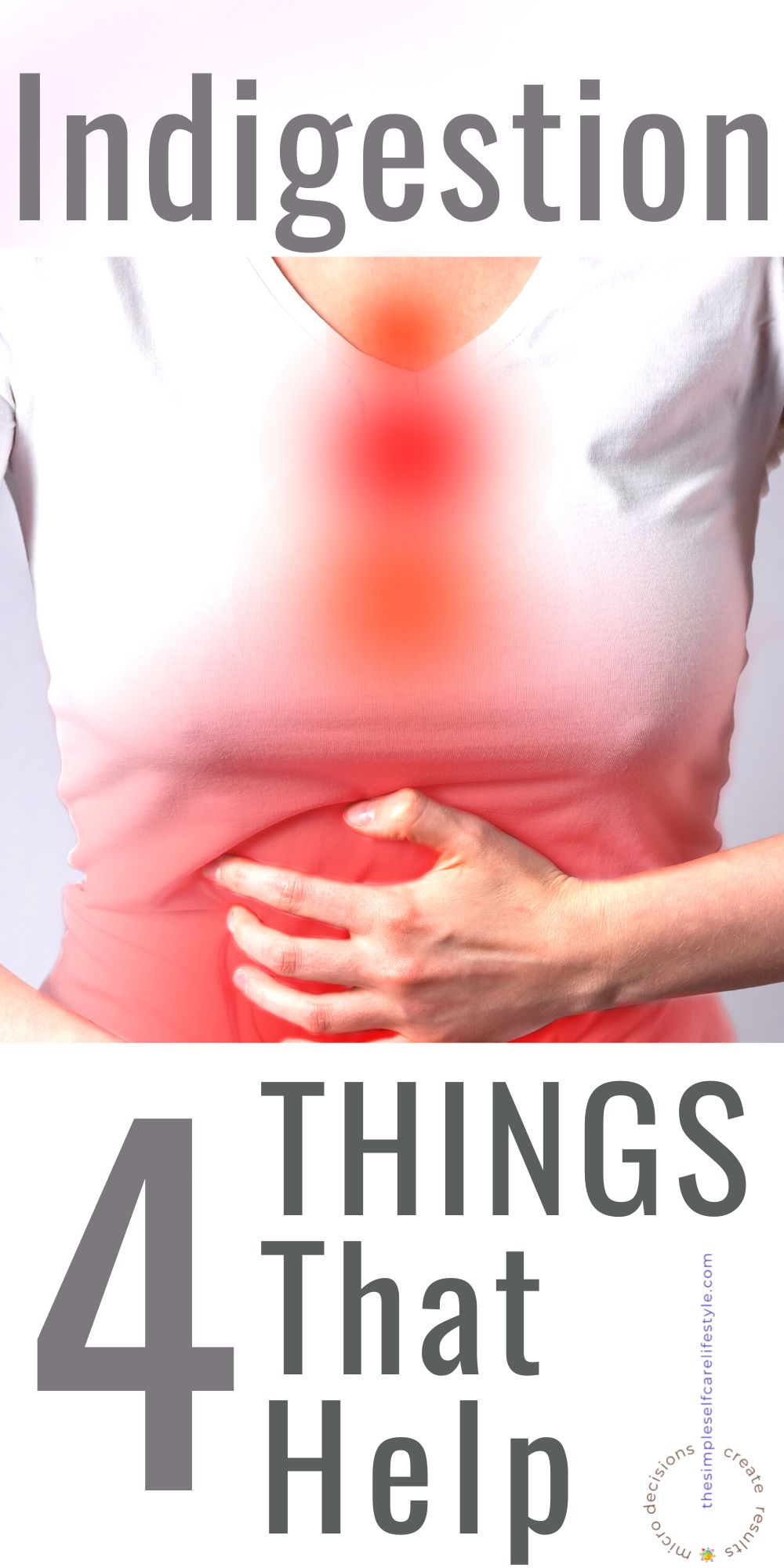
Post Link Indigestion 4 Things That Help



Interested in reducing toxins? Other Post Links for you:
How to Avoid Nail Polish Toxins
Plastic in Tea bags! Yup Billions of particles
Best Non-Toxic Tea Kettle, Tea Pot and Infuser Material
Choosing Safe Candles For Your Home
🌿 Resources/References for you:
1. U.S. Department of Health and Human Services. (n.d.). Definition & Facts of Indigestion. National Institute of Diabetes and Digestive and Kidney Diseases. Retrieved November 13, 2022, from https://www.niddk.nih.gov/health-information/digestive-diseases/indigestion-dyspepsia/definition-facts
2. Proton pump inhibitors – what are PPIS & how do ppis work? Drugwatch.com. (n.d.). Retrieved November 12, 2022, from https://www.drugwatch.com/proton-pump-inhibitors/
3. Staff, U. H. N. (2021, November 9). Low stomach acid: A surprising cause of indigestion symptoms. University Health News. Retrieved November 13, 2022, from https://universityhealthnews.com/daily/digestive-health/low-stomach-acid-the-surprising-cause-of-many-indigestion-symptoms/
4. Michael T. Murray ND, in Textbook of Natural Medicine (5th Ed), 2020
6. Mousa H, Hassan M. Gastroesophageal Reflux Disease. Pediatr Clin North Am. 2017 Jun;64(3):487-505. doi: 10.1016/j.pcl.2017.01.003. PMID: 28502434; PMCID: PMC6509354.
7. Werlin SL, Dodds WJ, Hogan WJ, Arndorfer RC. Mechanisms of gastroesophageal reflux in children. J Pediatr. 1980 Aug;97(2):244-9. doi: 10.1016/s0022-3476(80)80482-3. PMID: 7400890.
Additional Resources:
Gastric Hypoacidity – an overview | ScienceDirect Topics. https://www.sciencedirect.com/topics/medicine-and-dentistry/gastric-hypoacidity
Low Stomach Acid: Causes and Treatment – A.Vogel. https://www.avogel.ca/blog/low-stomach-acid-causes-and-treatment/
Santoro S. Stomachs: does the size matter? Aspects of intestinal satiety, gastric satiety, hunger and gluttony. Clinics (Sao Paulo). 2012;67(4):301-3. doi: 10.6061/clinics/2012(04)01. PMID: 22522753; PMCID: PMC3317257.
Engevik AC, Kaji I, Goldenring JR. The Physiology of the Gastric Parietal Cell. Physiol Rev. 2020 Apr 1;100(2):573-602. doi: 10.1152/physrev.00016.2019. Epub 2019 Oct 31. PMID: 31670611; PMCID: PMC7327232.
How Nutrients from Food are Absorbed in the intestine. http://www.actforlibraries.org/how-are-nutrients-from-food-absorbed-in-the-intestine/
The Simple Self Care Lifestyle
THe simple self care lifestyle
Simplify
self care
Post categories

